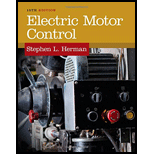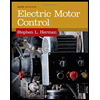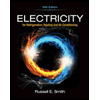
Concept explainers
Excluding slip, at what speed (r/min) will an eight-pole, 60-hertz, 240-volt motor run?
Calculate the speed in rpm for of an eight pole,
Answer to Problem 1SQ
The speed in rpm of a squirrel cage induction motor is
Explanation of Solution
Given data:
The number of poles
The frequency
The line voltage
Formula Used:
Write the expression to calculate the speed in rpm of a squirrel cage induction motor.
Calculation:
The total number of poles in the motor is
Substitute
Conclusion:
Thus, the speed in rpm of a squirrel cage induction motor is
Want to see more full solutions like this?
Chapter 31 Solutions
Electric Motor Control
- Question No. 4 hand written withn expanation (a) Design a circuit using D flip-flops that can be used to divide the clock frequency by 16. (b) Draw the input and output waveforms for each stage to the circuit designed in part (a).arrow_forwardhandwritten withn expanation need Question No. 4 ( (a) Design a circuit using D flip-flops that can be used to divide the clock frequency by 16. (b) Draw the input and output waveforms for each stage to the circuit designed in part (a).arrow_forwardDraw and explain the electronic circuit diagram of PID controller, Write its advantages anddisadvantages.arrow_forward
- Written Answer Needed Correct onearrow_forwardINSTRUCTIONS: only electrical engineering experts solve it correct take your 5hrs but solve accurate not ai answers okkkk Only Electrical engineering experts solve it okkMention Written Answer Needed Correct onearrow_forwardI need expert solution not Aiarrow_forward
- Question (a) Design a circuit using D flip-flops that can be used to divide the clock frequency by 16. (b) Draw the input and output waveforms for each stage to the circuit designed in part (a).arrow_forwardDon't use ai to answer I will report you answerarrow_forwardCorrect & written Based Need, No Copy Paste Chatgpt Answerarrow_forward

 Delmar's Standard Textbook Of ElectricityElectrical EngineeringISBN:9781337900348Author:Stephen L. HermanPublisher:Cengage Learning
Delmar's Standard Textbook Of ElectricityElectrical EngineeringISBN:9781337900348Author:Stephen L. HermanPublisher:Cengage Learning Electricity for Refrigeration, Heating, and Air C...Mechanical EngineeringISBN:9781337399128Author:Russell E. SmithPublisher:Cengage Learning
Electricity for Refrigeration, Heating, and Air C...Mechanical EngineeringISBN:9781337399128Author:Russell E. SmithPublisher:Cengage Learning


